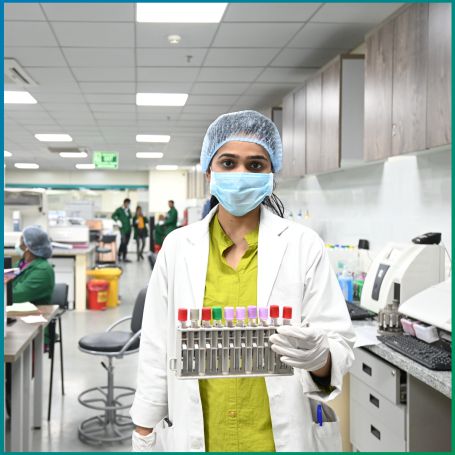
The corneal scraping test involves the collection of cells or tissue samples from the cornea's surface.


The corneal scraping test involves the collection of cells or tissue samples from the cornea's surface. This procedure is performed to diagnose infections, such as bacterial, fungal, or viral keratitis, as well as to identify inflammatory conditions or the presence of foreign bodies. By examining the scraped cells under a microscope, healthcare professionals can determine the cause of corneal issues and guide appropriate treatment.
1] Preparation: The eye is numbed using a topical anesthetic to minimize discomfort during the procedure. This step is crucial for patient comfort and cooperation.
2] Microscopic Examination: A sterile spatula or a small blade is used to gently scrape the surface of the cornea. The sample is collected from areas showing abnormalities, such as ulcers or lesions. The scraping must be performed delicately to avoid further injury to the cornea.
3] Sample Handling: The collected sample is placed on a glass slide or into a culture medium, depending on the tests planned. If a culture is to be performed, the sample may be inoculated onto specific growth media to facilitate the identification of microorganisms.
4] Post-Procedure Care: After the scraping, the eye may be rinsed with saline to remove any debris. Patients are usually advised to avoid rubbing their eyes and may be prescribed antibiotic or anti-inflammatory eye drops to prevent infection or manage inflammation.
1] Suspected Corneal Infection: When patients present with symptoms of keratitis, such as redness, pain, tearing, or vision changes, a corneal scraping can help identify the causative organism.
2] Non-Healing Ulcers: If a corneal ulcer does not respond to initial treatment, scraping can provide additional information about the underlying cause.
3] Foreign Body Sensation: In cases where a patient experiences persistent discomfort, scraping may help detect any foreign material lodged in the cornea.
4] Unexplained Inflammation: If corneal inflammation is present without a clear cause, scraping can help identify infectious agents or other factors contributing to the condition.
1] Positive Culture: If a specific pathogen is identified in the culture, targeted treatment can be initiated. For example, if bacteria are found, appropriate antibiotics can be prescribed.
2] Negative Culture: A negative Corneal Scraping test result does not rule out all possible causes. Other non-infectious conditions or pathogens not detected by standard culture methods may still be present.
3] Presence of Inflammatory Cells: If inflammatory cells are found without an identifiable pathogen, it may indicate an autoimmune or allergic condition affecting the cornea.
You should choose nearest diagnostic centre in Mumbai for your CORNEAL SCRAPING Test because we are committed to providing high-quality diagnostic care in a clean and hygienic environment. Our center is equipped with advanced technology to ensure accurate and reliable test results, which are crucial for assessing this test. Diagnopein’s experienced staff is dedicated to handling tests with precision and care, offering you both expertise and comfort. We also offer affordable pricing, making essential health diagnostics accessible without compromising quality. For timely, professional, and affordable cardiac testing, Diagnopein is your trusted partner for your healthcare.
There is generally no special preparation required, but you should inform your healthcare provider about any medications you are taking, allergies, or prior eye surgeries.
Most patients experience minimal discomfort due to the anesthetic. Some may feel a slight scratch or pressure during the procedure, but it is generally well-tolerated.
While generally safe, potential risks include minor discomfort, corneal injury, and, although rare, the introduction of infection. Proper sterile techniques help minimize these risks.
Corneal scraping is a routine procedure in ophthalmology, especially in emergency settings or specialized eye clinics, to diagnose various corneal conditions.